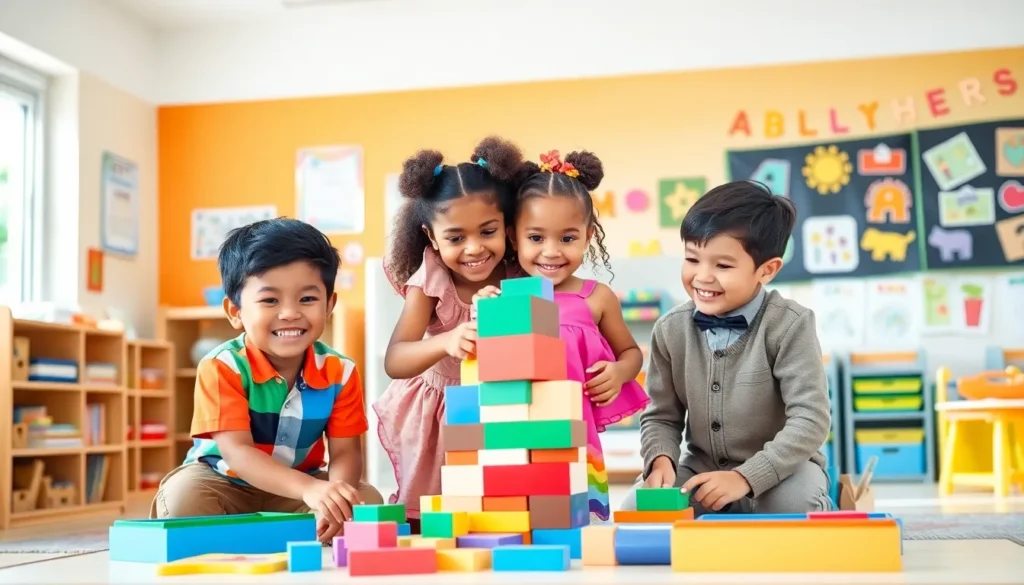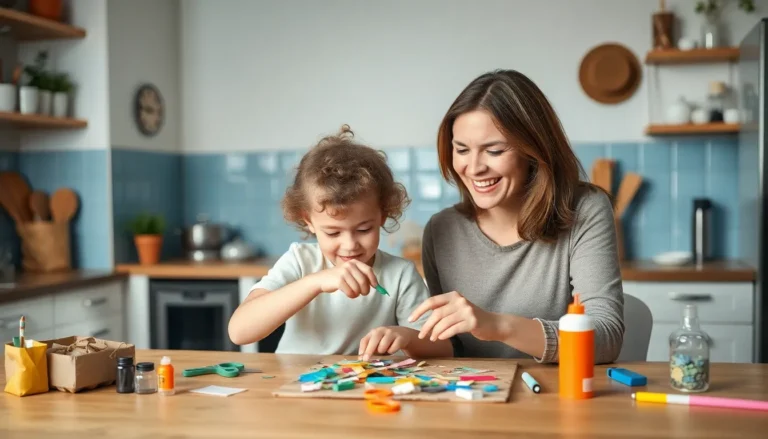Finding the right early learning daycare can feel as daunting as climbing a mountain in flip-flops. Is it the right fit? Will they teach my child more than just how to color outside the lines? Fear not. This guide is here to demystify early learning daycare and make the search as straightforward as pie. (And yes, we all love pie.) Let’s jump into what makes these centers tick, what to look for when choosing one, and why they could be a game-changer for your child’s development.
Table of Contents
ToggleWhat Is Early Learning Daycare?

Early learning daycare refers to child care facilities that focus on foundational education and enriching experiences for children typically from birth to age five. These centers go beyond just babysitting: they provide structured programs that foster cognitive, emotional, and social development.
Think of it as a fusion between playtime and learn time. Children participate in various activities designed to stimulate their curiosity, creativity, and critical thinking. The best part? They do all this while forming friendships and learning to play nicely with others, a skill that, let’s be honest, is essential for adulting.
In essence, early learning daycare is where the magic of learning starts. It gets children excited about knowledge so they can blaze trails in their future educational endeavors.
The Importance of Early Childhood Education
Early childhood education lays the foundation for lifelong learning. Studies suggest that children who participate in quality early education programs are better prepared for school and tend to have higher academic achievements later on.
Why is this the case? Early learning experiences enhance brain development during critical growth periods. This is when neural connections are forming at a staggering rate, about 700 new synapses are created every second. It’s no surprise that experiences during these formative years can shape everything from literacy skills to emotional regulation.
Also, early education programs often include social skills training which can lead to improved relationships later in life. Who wouldn’t want their child to be best friends with the concept of teamwork? Essentially, early childhood education isn’t just about managing a classroom: it’s about preparing children for the world.
Key Features of a Quality Early Learning Daycare
When searching for a quality early learning daycare, several key features should catch your attention:
- Qualified Staff: Are the teachers trained in early childhood development? Their education should go beyond babysitting merits. Look for certifications and degrees tailored to child development.
- Curriculum: A structured curriculum emphasizes play-based and hands-on learning. Whether they focus on STEAM (Science, Technology, Engineering, Arts, and Mathematics) or social skills, ensure it aligns with your child’s needs.
- Safety Standards: Safety is non-negotiable. Check for secure entry points, clean facilities, and staff trained in first aid.
- Parental Involvement: A good daycare should encourage parent participation through open communication, events, and feedback opportunities.
- Play Areas: Look for both indoor and outdoor spaces that allow for diverse experiences, swing sets, art corners, and even quiet zones for down time.
By focusing on these features, parents can feel confident they are investing in a positive and enriching experience for their children.
Choosing the Right Early Learning Daycare
Choosing the right daycare for your little one is akin to finding a needle in a haystack. Here are some practical steps to make the process easier:
- Research Options: Start with online searches and call local daycares for initial information. Personal referrals can be incredibly valuable, too.
- Visit Facilities: Visit potential daycares to get a feel for their environment. Pay attention to cleanliness, interaction levels among staff and children, and overall energy in the space.
- Ask Questions: Don’t be shy. Inquire about the curriculum, daily schedules, and staff qualifications. You can even ask about how they handle challenging behavior or emergencies.
- Trust Your Instincts: Eventually, trust your gut feeling. You’ll know in your heart when a place feels right for your child.
Benefits of Early Learning Daycare
Early learning daycare isn’t just a fancy phrase. It encompasses numerous advantages:
- Socialization: Children learn to interact and communicate with peers, laying the groundwork for teamwork and friendship.
- Cognitive Development: Engaging and age-appropriate educational activities stimulate cognitive growth. A child learns to think critically and solve problems from a young age.
- Routine and Structure: Regular schedules provide children with a comforting sense of predictability, reducing anxiety when transitioning to formal schooling.
- Emotional Growth: High-quality daycares provide nurturing environments that help develop self-regulation and emotional awareness.
Overall, early learning daycare services are more than just a place for kids to play while parents work. They shape holistic development in ways that benefit children throughout their lives.
Common Myths About Early Learning Daycare
- It’s Just Babysitting: A prevalent myth is that daycares are simply glorified babysitters. In reality, they are designed to educate and enrich.
- Children Will Become Too Dependent: Parents often fear that their child will become reliant on the daycare environment. But, early learning helps them gain independence through structured activities.
- Not Necessary for Every Child: Some parents think that as long as they provide home learning experiences, daycare isn’t required. This can overlook the social and emotional benefits that daycare provides.
- Only for Working Parents: Many believe that daycare centers are only for parents who work full-time. In truth, they can benefit a wide range of families.
Dispelling these myths helps parents make informed choices and understand the invaluable impact of early learning daycare.








